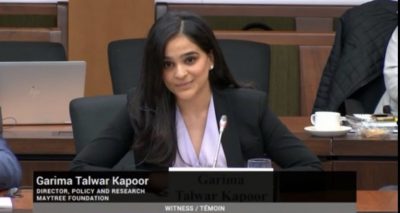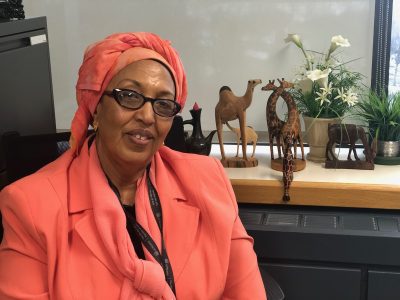By Mary Giles

Garima Talwar Kapoor
To help solve complex problems, Garima Talwar Kapoor brings together research and ideas from diverse areas of government, civil society and private industry. “Realizing our economic and social rights requires developing inter-connected and synergistic social, fiscal and economic policy solutions that transcend one single area of policy,” she says.
After graduating from the Bachelor of Public Affairs and Policy Management (BPAPM) program in 2011, Talwar Kapoor completed a master of public health (MPH) at the University of Toronto. She then worked as a policy analyst for the Ontario Ministry of Training, Colleges and Universities, and as a senior economist, special policy advisor and manager for the Ontario Ministry of Finance.
For the last two years, Talwar Kapoor has served as director of policy and research at the Maytree Foundation in Toronto, a charitable organization focusing on finding solutions to poverty taking a human rights approach.
Talwar Kapoor is interested in how changes in the labour market and economy are shaping our communities and well-being. She is passionate about finding policy solutions that help alleviate the precarity in income and housing affordability that many are experiencing across Canada.
Interdisciplinary Studies a Career Advantage
“BPAPM is close to my heart,” says Talwar Kapoor. “The biggest thing I took away from the program is a really deep interdisciplinary learning that enabled me to move on to my MPH and have a varied career in policy. The interdisciplinary nature of the program encourages students to learn how to address real-world problems from a variety of different vantage points.
“I was able to draw connections between disparate parts of society — how people live their lives, how governments work and how historical contexts shape what’s happening globally and locally.
“The BPAPM helped me think about the interdependence between different aspects of society and the connections across policy areas and across ministries. The program also demonstrates that effective policy making is a complex process.”
Emphasizing Post-Pandemic Social Architecture
In Talwar Kapoor’s work with Maytree, she leads a team that focuses on undertaking policy research and developing policy ideas that, among other areas, help strengthen income security and improve access to affordable housing. The COVID-19 pandemic has magnified existing problems in economic and social policies.

Garima Talwar Kapoor, presenting to the Standing Senate Committee regarding Bill C-97 on June 5, 2019, where she argued that the National Housing Strategy Act provides us with an opportunity to re-set the framework within which we conceptualize, develop and implement housing policy in Canada.
For example, the Canada Emergency Response Benefit (CERB) has helped many people get through this time of crisis, but it was a short-term benefit. Talwar Kapoor says, “As governments across Canada shift their economic, fiscal and social policy responses to different phases of the COVID-19 pandemic, we also need to think about what kind of social safety net we are creating so that we can better safeguard Canadians against such shocks and reduce the levels of income volatility that so many experience.”
In the Maytree article, Five good ideas for income supports in a post-CERB Canada, Talwar Kapoor puts forward some key recommendations for governments:
- Strengthen the Canada Social Transfer
- Modernize and broaden access to Employment Insurance
- Design and implement a refundable working-age tax credit
- Build a modernized data collection and administrative system
- Articulate what the principles of the human right to social security look like
“If you think about what a post-pandemic social architecture could look like in Canada, we need to support both those with work experience and those who are distant from the labour market and living in poverty,” she says.
“The CERB was successful for those who were previously employed and had lost income during the first lockdown. It encouraged them to stay home to avoid spreading the virus. People with lower incomes or those on social assistance and living in deep poverty received little support and have fallen further behind.”
Housing as a Fundamental Human Right
When we think of human rights, we often focus on civil and political rights, but economic and social rights are just as important. Access to adequate and affordable housing, food, water, education and healthcare are just some of the rights that ensure human dignity.
Talwar Kapoor says, “Canadians regard ourselves highly because we do well on civil and political rights, but you can only know where and how to vote if you have a mailing address for your voter information card. How do you realize this civic right if you don’t have an address? And these issues are becoming exacerbated with the pandemic. Without a policy to prevent rent arrears, large-scale evictions, as we’re seeing now in Ontario, will affect the lives of many individuals and families over the long term.”
Access to safe, secure and affordable housing is a policy focus area that is top priority for Talwar Kapoor. “It has been made clear that you cannot be healthy or safe if you don’t have affordable housing,” she says.
“What does an adequate standard of living look like? It’s not necessarily only about providing basic income. In housing markets where rent and housing prices are so inflated, a cheque is not enough. We have to think comprehensively and courageously about the type of society we want to live in, and work to realize that vision.”
Friday, January 15, 2021 in Alumni Stories, FPA Voices
Share: Twitter, Facebook



